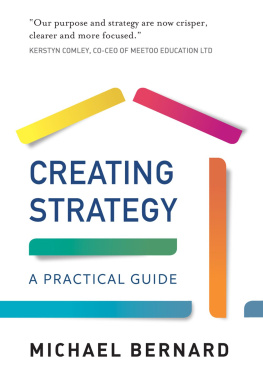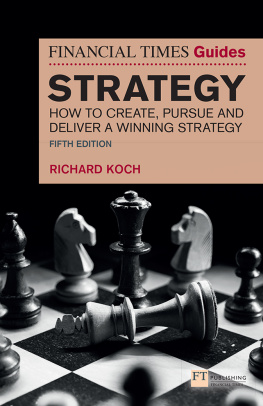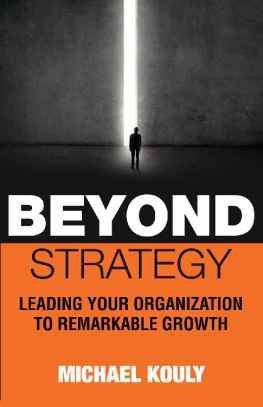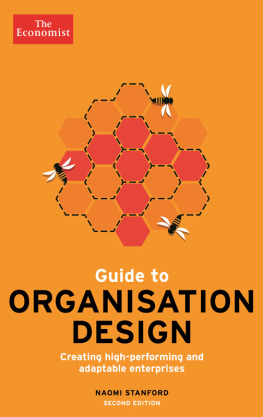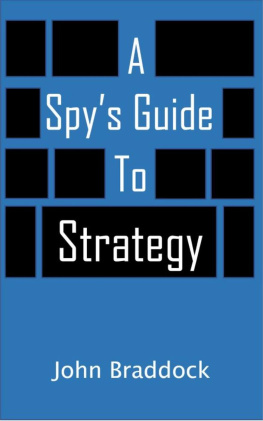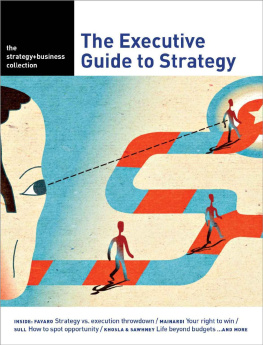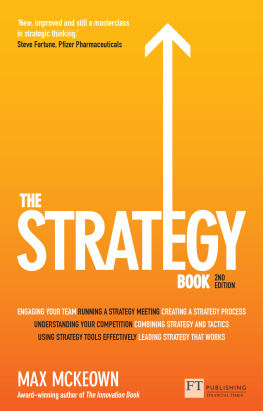Contents
Guide
Creating Strategy
First published in 2021 by
Panoma Press Ltd
48 St Vincent Drive, St Albans, Herts, AL1 5SJ, UK
www.panomapress.com
Book layout by Neil Coe.
978-1-784525-54-5
The right of Michael Bernard to be identified as the author of this work has been asserted in accordance with sections 77 and 78 of the Copyright, Designs and Patents Act 1988.
A CIP catalogue record for this book is available from the British Library.
All rights reserved. No part of this book may be reproduced in any material form (including photocopying or storing in any medium by electronic means and whether or not transiently or incidentally to some other use of this publication) without the written permission of the copyright holder except in accordance with the provisions of the Copyright, Designs and Patents Act 1988. Applications for the copyright holders written permission to reproduce any part of this publication should be addressed to the publishers.
This book is available online and in bookstores.
Copyright 2021 Michael Bernard
To my wife Catherine and children Christopher,
Henry and Dominic with my daughter-in-law Mary,
who together provide my purpose!
TESTIMONIALS
Michael has helped us to completely transform the way that we think about our mission, our strategy and our values. Our purpose and strategy are now crisper, clearer and more focused. It has reinvigorated the whole organisation.
Kerstyn Comley, Co-CEO of MeeToo Education Ltd
Michaels structure and coaching really helped us distil our broad direction into a coherent strategy. The structure has turned out to be durable, and we are still using it to positive effect today. Once created, a decent strategy offers a framework which simplifies operational decision-making. Recommended!
Gary Moore, CEO of AbilityNet
Michaels help in creating our strategy has been invaluable. His communication, both written and spoken, is notable for its complete absence of jargon, conveying complex ideas with simple and compelling clarity. You always feel you are making progress and get a sense of satisfaction as the pieces click into place.
His book is a must-have for anyone who wants their strategy to live and inspire.
Andrew Hobbs, Head of Downside School
As a business owner of a successful publishing and events company, I found my discussions with Michael illuminating and very rewarding. He has a very clear understanding of all the components which build company strategy and how and why these need to be carefully defined. There is no one in my experience who has conceptualised this better. As a company which has grown rapidly over the past decade or so and wants to keep on developing, Michaels precise insights into strategy were enormously helpful in formulating my own thinking in wanting to put theory into practice. I cant wait to read Michaels book because I know it will be invaluable.
Mark Allen, Chairman of Mark Allen Group
An absolute must-read for anyone involved in the development of strategy for their organisation. A practical, down to earth guide using case studies to illustrate what happens when strategies are well developed and when they are not!
Janet Morris, Non-Executive Director, Trustee and Consultant
First of all, I have to recognise that almost everything I have learned about business and strategy was through my work for IBM over more than 30 years. Its a very different company to the one I joined in 1981, but still an extraordinary one filled with hugely talented people.
As I then worked with other organisations, I would like to thank those at AbilityNet (a charity that provides technological support to those with impairments), The Royal Humane Society (a charity that recognises life-saving and bravery); Downside school; Exeter Business School and in particular its outstanding MBA course; MeeToo Help (a social enterprise providing help to young people with mental health concerns) and last, but not least, Southern Health NHS Foundation Trust. It has been my role to provide guidance and challenge to these organisations, but I have found that I have been challenged just as much by them to keep learning and broadening my thinking.
To many friends, colleagues and contributors, a profound thank you: Martin Beckwith, Janet Morris, Chris Barraclough, Andrew Chapman, Alan Barnard, Martin Thomas, Mark Allen, Brendan Dineen, Mike Lusby and many others, including those who contributed case studies that had to be anonymised. If you should be on this list and are not, I apologise for my faulty memory!
CONTENTS
Strategy is everything.
Sergio Zyman (former CMO of Coca Cola)
When I took up my first board role, I had to learn a new set of skills. Instead of being responsible for day-to-day activities, as I was in my day job, my new role was to ensure that the executive team ran the organisation effectively. As I have taken on additional such roles, one of the most frequent tasks has been to review strategy work and make sure that it is done well. Every board should believe that it is responsible for the strategy of the organisation that it serves. This is one of the most important roles of a board.
The way this usually works, in theory, is that 1-2 weeks before the board meeting, papers are sent out so that the board can read them, come to the meeting without needing to have the paper presented from scratch, and then a useful discussion can take place. In practice, papers are often sent out at the last minute or even not sent in advance at all.
Oddly, given that presenting strategies to the board is done so regularly, the quality of strategy has been uniformly weak. The reasons are usually very similar and drove me to think about why people dont write better strategies.
It seems to me there are two fundamental problems. The first is that most people who write strategies have very little training, coaching or experience in doing so. The second is that those who review them dont know what to look for or how to assess the quality of what they are looking at. Given how important it is for any organisation to have a good strategy, theres little to no training available on how to create one. Even an MBA course will not give much practice in writing strategies, even if they spend quite a lot of time looking at case studies and critiquing them. In my experience, companies dont send employees on courses about strategy. They dont expect people to read books on strategy as part of their development plans. There isnt a formal career path that leads to chief strategy officer unless it is working for a consultancy and then going client-side. There isnt to my knowledge a professional body for strategy writers. So I suppose its not very surprising that many of the people who do the task lack the necessary skills.
While consultants can help with a structure and process for creating strategy and by providing input, particularly in the analysis stage, the key decisions have to be taken within the company. These are some of the most important bets that the leadership team will make, and it is inconceivable to me that outsourcing responsibility for strategic decisions is consistent with good leadership or good governance.
The purpose of this book is, therefore, to give a relatively simple guide to anyone writing a strategy paper for an organisation, large or small. Its based on my experience in IBM, a leading business school, a social enterprise, charities and the NHS, on my own learnings from trying to write them myself, with varying levels of success, and on many conversations Ive had as I researched and discussed this topic.

